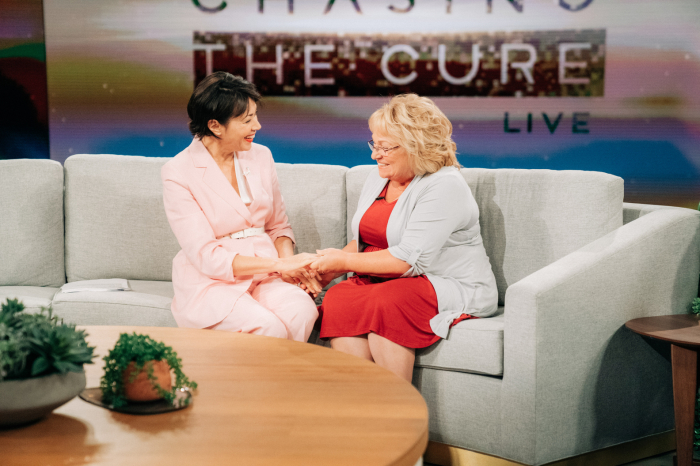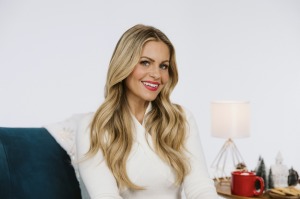Ann Curry: Groundbreaking show 'Chasing the Cure' highlights human 'capacity for good'

“Chasing the Cure,” the groundbreaking new show from former “Today” show host Ann Curry, is proving that today’s social media-fueled hyper-connectedness can be harnessed for good — and even save lives.
The program, which airs Thursdays on TBS and TNT, features patients broadcasting their undiagnosed, misdiagnosed or uncured medical mysteries. Then, a team of medical professionals are brought in to try and assist the patient — all on live TV.
What separates “Chasing the Cure” from other medical shows is the “crowdsourcing” element: Viewers are able to dial in, text or use hashtags on social media to comment with their thoughts about the patient’s individual case, or share their experiences and suggestions regarding what the patient might be suffering from.
“There are more than 250 million people in the world with undiagnosed illnesses, and that’s a shocking number,” Curry told The Christian Post. “We’re giving these people an opportunity to come before doctors and find answers they wouldn’t have found otherwise.”
“We’re siloed by where we live, by our medical insurance, by how many specialists we can get to, and by what we can financially afford to reach," she said. "Often, people are unable to get the care they need. We have a wonderful country with amazing quality of medicine that most people don’t have access to. We’re trying to punch a hole in those dialogues and see what’s possible.”
Curry told CP the idea for the show came after her colleague, Jennifer O’Connell, saw that her son’s teacher had posted an appeal on Facebook about her husband being sick.
“The couple couldn’t afford care and they couldn’t figure out the source of his illness,” she said. “She thought, ‘What if live TV could amplify these kinds of stories?’ From there, everything snowballed.”
From the very beginning, the seasoned journalist said she’s viewed herself, first and foremost, as a “patient advocate.”
“What made me say yes was, I was promised that we would proceed with every major decision made with patients first,” she said. “And they have kept that promise.”
Already, the show has done “tremendous” good for patients, Curry said. She shared the story of a 22-year-old social media influencer who reached out to the digital platform looking for help after a severe undiagnosed condition left her with missing teeth.
“She couldn’t smile or eat properly,” Curry recalled. “We put her on our show, and she was flooded with positive support and messages from so many people who have the same problem and haven’t gotten the care they need.”
The woman’s case attracted the attention of a cosmetic surgeon who read her case file and offered to fix her smile at no cost to the patient or her family.
“He helped her eat and smile normally again at 22,” Curry said. “Her family had spent so much money taking care of her and she’d felt so guilty about the financial strain she put on them. Their reaction was just incredible. It’s an amazing story about connections and punching holes in siloes to help people get the care they need.”
Another "Chasing the Cure" case involved a mother and daughter, both experiencing similar but different ailments, including the loss of their sight.
“This had been going on for 12 years, and nobody could solve it. It was a total medical mystery,” Curry said. “We brought out our team of doctors who recommended genetic testing. It turns out, these two women were only the seventh and eighth people in the world with an exceedingly rare and newly discovered disease.”
“Within hours after this diagnosis, there was a phone call with researchers who had taken care of the other six patients in Norway, Germany, Italy, and U.S. with this same disease, and these researchers all got together to talk about this case and what can be done. For these women, this show has changed their lives.”
With over 30 years in the media industry, Curry said she’s always viewed journalism as a “service job,” whether it’s covering human suffering in war zones or natural disasters around the world. “Chasing the Cure,” she said, gives her another opportunity to give truth and compassion a voice.
“Good information is extremely powerful in this world. I learned early on the importance of truth,” she said. “If you’re on the side of truth, that means you are looking for what's real, not opinion. When you do that, it’s a service job.”
“For me, this is no different than what I’ve always tried to do: Tell the truth, and have faith that when people hear the truth, they will be moved and learn something and find a layer of passion that might awaken an even deeper layer of compassion,” she added.
Throughout her storied career, Curry said she’s been “overwhelmed” by the “human capacity for good.”
“I’m more hopeful than I've ever been about humanity because I've learned from this work that compassion isn’t something you learn; it’s deeply rooted in each and every one of us and deep down in our DNA. It comes out when we practice it. The more we practice it, the better we get.
“I want to see more of that, and I know I will,” she continued, “because when you tell stories about people who are vulnerable and need to be heard, you will be given a voice. There will be those who will listen and care. I believe 'Chasing the Cure' is proving that.”
"Chasing the Cure" airs live on Thursdays at 9 p.m. ET on TNT and TBS.



























